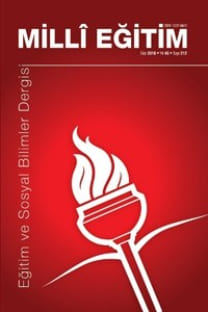COVID-19 EĞİTİM SÜRECİNE KÜRESEL BİR BAKIŞ VE TÜRKİYE’NİN BU SÜREÇTEKİ EĞİTİM REAKSİYONLARININ DEĞERLENDİRİLMESİ
uzaktan eğitim, Covid-19 Pandemisi, okulların kapanması, internetten öğretim/öğrenim
A GLOBAL GLANCE AT COVID-19 EDUCATION PROCESS AND CONSIDERING TURKEY’S COVID-19 RESPONSE
distance education, covid-19 pandemic, school closures,
___
- Parreiras, C. & Mourão, R. M. (2020). Digital inequalities and education in Brazil during the COVID 19 pandemic. Digital Culture and Education (ISSN: 1836-8301). Retrieved from https://www.digitalcultureandeducation.com/reflections-on-covid19/digital-inequalities-and-education-in-brazil?rq=inequalities Date Accessed 21.07.2020.
- Van Lancker, W., & Parolin, Z. (2020). COVID-19, school closures, and child poverty: a social crisis in the making. The Lancet Public Health, 5(5), e243-e244.
- WEB 1: Retrieved from https://en.unesco.org/covid19/educationresponse on 18.07.2020.
- WEB 2: Retrieved from https://bangkok.unesco.org/content/building-back-better-national-response-and-recovery-plan-reopening-myanmars-schools on 17.07. 2020.
- WEB 3: Retrieved from https://en.unesco.org/covid19/educationresponse/nationalresponses on 23.07. 2020.
- WEB 4a-4b: Retrieved from https://reliefweb.int/sites/reliefweb.int/files/resources/IRB%202020-10.pdf on 21.07. 2020.
- WEB 5: Retrieved from https://www.unicef.org/appeals/files/UNICEF_Tanzania_Humanitarian_Situation_Report_No2_for_January__June_2020.pdf on 20.07. 2020.
- WEB 6: Retrieved from https://www.globalpartnership.org/blog/school-interrupted-4-options-distance-education-continue-teaching-during-covid-19 on 21.07. 2020.
- WEB 7: Retrieved from https://gemreportunesco.wordpress.com/2020/06/12/covid-19-pandemic-and-indigenous-and-non-indigenous-students-in-mexico/ on 28. 07. 2020.
- WEB 8: Retrieved from https://en.unesco.org/news/learning-through-radio-and-television-time-covid-19 on 21.07. 2020.
- WEB 9a-9b-9c: Retrieved from https://gemreportunesco.wordpress.com/2020/04/02/covid-19-how-is-italy-coping-with-school-closure/ on 25.07.2020.
- WEB 10a- 10b-10c: Retrieved from https://tegv.org/dosyalar/covid-19-donemi-uzaktan-egitim-durum-degerlendirme-raporu.pdf on 27. 07. 2020.
- WEB 11: Retrieved from https://www.ncsl.org/research/education/public-education-response-to-coronavirus-covid-19.aspx on 22. 07. 2020.
- WEB 12: Retrieved from https://www.usatoday.com/story/news/education/2020/03/28/pbs-on-line-learning-lausd-coronavirus-school-closures-tv-fox/2925962001/ on 24. 07. 2020.
- WEB 13: Retrieved from https://www.ukfiet.org/2020/covid-19-how-is-italy-copying-with-school-closure/ on 22. 07. 2020.
- WEB 14: Retrieved from https://data2.unhcr.org/en/documents/download/76636 on 25. 07. 2020.
- WEB 15: Retrieved from https://data2.unhcr.org/en/documents/download/76640 on 26. 07. 2020.
- WEB 16a-16b: Retrieved from https://www.agcom.it/documents/10179/14037496/Studio-Ricerca+28-02-2019/af1e36a5-e866-4027-ab30-5670803a60c2?version=1.0 on 24.07. 2020.
- WEB 17: Retrieved from https://www.aa.com.tr/tr/egitim/turkiye-uzaktan-egitim-istatistikleriyle-dijital-dunyanin-listelerini-zorladi/1882614 on 24.07. 2020.
- ISSN: 1302-5600
- Yayın Aralığı: Yılda 4 Sayı
- Başlangıç: 1973
- Yayıncı: Milli Eğitim Bakanlığı
İLKOKUL ÖĞRENCİ VE VELİLERİNİN PERSPEKTİFİNDEN COVİD-19 SALGINI SÜRESİNCE UZAKTAN EĞİTİM
Züleyha ERTAN KANTOS, Aslı YURTTAŞ, Murat TAŞDAN, Zühal TOPCU
SINIF ÖĞRETMENİ ADAYLARININ KÜLTÜREL AÇIDAN KARMA ÖĞRENME ORTAMLARINA İLİŞKİN YANSITMALARI
OKUL MÜDÜRLERİNİN ÇATIŞMA DURUMUNDA DUYGUSAL ZEKÂ BECERİLERİNİ YÖNETEBİLME YETERLİKLERİ
TÜRKÇE ÖĞRETİMİNDE BİR İHTİYAÇ OLARAK KILAVUZ KİTAPLAR VE DERS PLANI
Nuhpelda ÖZORUÇ, Ayperi DİKİCİ SIĞIRTMAÇ
Beyhan Nazlı KOÇBEKER, Emine SEÇİL KARAMUKLU
COVID-19 SALGININDA ÖĞRETMENLERİN UZAK EĞİTİME İLİŞKİN DENEYİMLERİ
